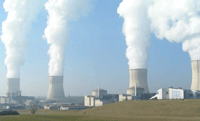 Vietnam should scale back its nuclear program, National Assembly representatives argued Friday, cautioning that massive spending on the country’s first nuclear power project would burden the economy.
Vietnam should scale back its nuclear program, National Assembly representatives argued Friday, cautioning that massive spending on the country’s first nuclear power project would burden the economy.
Vietnam should scale back its nuclear program, National Assembly representatives argued Friday, cautioning that massive spending on the country’s first nuclear power project would burden the economy.
In a report released last week, the government said commercial nuclear power was necessary in
However, Nguyen Minh Thuyet, a representative from
The project is estimated to cost US$12 billion, 75 percent of which will be funded by foreign loans, he said. The figure could grow to $16 billion if more modern technology is used.
“We will be caught off guard when the estimate surges,” Thuyet said, noting that government projects always exceed their spending estimates. He said $12 billion is already half of the country’s national reserves.
Despite the massive spending, the project will only be able to produce 4.4 percent of domestic power needs in 2025, he said. Moreover, Thuyet pointed out that nuclear power prices would be three times higher than current power rates.
“Is this a risk worth taking?” he asked.
Risky business
Thuyet also said
Representative Le Nhu Tien from
“Global uranium output can only meet 57 percent of global nuclear demand… The government needs to assess the long-term material supplies needed for the project.”
Several representatives said the government should only build one nuclear power plant at the moment, arguing that one plant would be better given the current economic situation and that the pressure on developing human resources for two power plants at the same time could also be eased.
But Industry and Trade Minister Vu Huy Hoang said the government had calculated power supply and demand carefully. “The power shortage will be critical in 2020, so it is necessary to build two nuclear power plants.”
“Both coal and oil reserves are running out, and we don’t have any other alternative energy resources right now,” newswire VnExpress quoted Hoang as saying.
The government has already launched research on energy solutions, said Hoang, but he warned that it would be a long time before the country would be able reduce its consumption of electricity and oil.
The National Assembly will make a final decision on the government’s nuclear power plan at the end of the ongoing session later this month.
If the two plant project is approved, construction would start in 2014 in order to open commercial operations in 2020.

 Previous page
Previous page Back to top
Back to top







